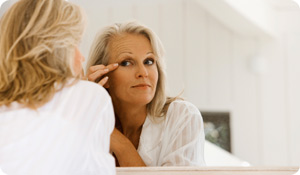
Your skin is your bodyís largest vital organóand the one that shows the world your age. Age-related skin changes develop more quickly once women are past menopause, but with a little TLC, your skin can still look healthy and beautiful for life.
Skin aging is caused by a combination of genetic, hormonal, and lifestyle factors that include the amount of time you spent in the sun, lifetime nutrition, your history of infections and skin conditions like acne, eczema, and skin cancers, plus exposure to cigarettes, alcohol, drugs and environmental factors. In addition, the hormonal changes women experience during and after menopause can change the way the skin functions.
"As a woman goes through menopause, she has less estrogen [a hormone], and that causes her skin to thin," explains Joyce Davis, MD, a dermatologist in private practice in Manhattan. "Cell turnover and recovery is slower, and thereís less collagen and elastin [proteins that promote healthy skin] production and repair in the dermis," the layer of tissue below the skin's surface. "Thatís why many post-menopausal women notice that their skin is dryer and less firm. They see more wrinkling and the effects of gravity and skin laxity [slackness]. They start to see the accumulation of sun damage and appearance of brown spots," AKA "age spots". Some women develop what dermatologists call age-related acne, when hormonal fluctuations cause breakouts on the face, chest, neck or back. More often though, Davis says, "when hormonal changes even out, women find that acne is finally, no longer a problem."
There are so many options available right now from over-the-counter skin care products to top-of-the-line medical treatments for women and men who want to improve their aging skinís appearance. While a trip to a dermatologist is a great way to find out exactly what your skin needs, many dermatologist-recommended skin care options are available at your local drugstore.
Just What the Doctor Ordered
"In terms of at-home care, I tell my post-menopausal patients to use a rich, moisturizing cleanser," Davis says. "I think Basis makes a terrific bar soap for sensitive skin. Dove is another good choice, though not quite as moisturizing. Next, youíll need a good moisturizer to combat dryness, which dulls the skin and causes redness and itching. If youíre not dealing with acne, your products donít need to be oil-free. Use heavier creams, like Nivea or Cetaphil in cold weather, and lotions, like Aveeno, in warm weather.
"Apply your moisturizer when your skin is wet. Ideally, my patients already use sun block to prevent sun damage. If you donít, start now. Lots of skincare products and cosmetics contain sunscreen, which makes it easier to apply some every day." The American Academy of Dermatology recommends that everyone apply a water resistant, UVA- and UVB-blocking sunscreen with an SPF (sun protection factor) of 30 or higher, 15 minutes before heading outside.
What if your skin needs more attention or youíre dealing with specific problems? Then itís time to see your dermatologist, where "It all starts with an individualized consultation to determine what you need and want," Davis says. "People used to think it was a facelift or nothing, but thatís not the case any more."
Today, "We have a wide range of treatment options to choose from. For instance, we can inject fillers to puff out the skin and minimize wrinkles, or inject it in strategic places along the cheekbones and jaw line to give skin a lift. We have customized lasers that tighten the skin and all kinds of topical [applied to the skin] treatments and creams. We have a whole generation of retinoid products [treatments derived from vitamin A] that work beautifully to minimize wrinkles, even out skin tone, and give the skin a fresher appearance. There are peptides [molecules made up of two or more amino acids, the building blocks of proteins], acids, peels, and all kinds of approaches for dealing with aging skin."
The bottom line? If you're concerned about your skin at any age, see a dermatologist, who can help decide the best approach to healthier skin.
Joyce Davis, MD, reviewed this article.
Sources
Davis, Joyce MD. Phone Interview Jan. 6, 2016.
Sator PG. "Skin Treatments and Dermatological Procedures to Promote Youthful Skin." Clinical Interventions in Aging 2006; 1(1):51-56.





